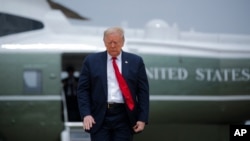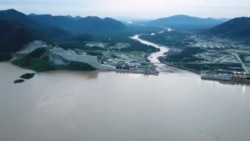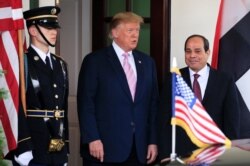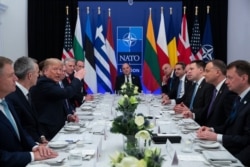Since President Donald Trump announced an America First approach on foreign policy in his inaugural address in January 2017, critics have accused him of abandoning international norms and forsaking U.S. global leadership, while supporters say he has boldly taken on foreign policy challenges that his predecessors have failed, including defeating a global terrorists network and challenging a rising China.
“His America First agenda has secured the elimination of two most-wanted terrorists, Abu Bakr al-Baghdadi and Qassem Soleimani, the destruction of the ISIS caliphate, and sustained strong political and economic pressure on adversaries like Iran, Venezuela, and Russia,” Ken Farnaso, the Trump campaign’s deputy national press secretary, told VOA.
But, for a president who once promised to bring his “Art of the Deal” business savvy to settling foreign disputes, and has spent considerable diplomatic resources on them, Trump has yet to deliver in his efforts to mediate peace in conflict hot spots around the world -- from the Balkans to the Nile Basin.
Trump the mediator
Trump, the one-time New York real estate businessman and reality TV star, has inserted his administration in dispute negotiations, some of which began in his first year in office. He has more than once offered to mediate between India and Pakistan on the issue of Kashmir, which New Delhi has rejected. India has also rebuffed Trump’s offer to mediate its border feud with China.
In trying to mediate between Israel and the Palestinians, and Kosovo and Serbia, Trump picked up on efforts by past administrations. Other efforts at intervention, including getting involved in the feud over a hydroelectric dam between Egypt and Ethiopia, are entirely of his own making.
So far, none of these initiatives has borne agreements accepted by the disputing parties. Israel is on the brink of annexing about 30% of the West Bank which includes areas populated mainly by Palestinians. Meanwhile, Addis Ababa is allowing rain water to fill the Grand Ethiopia (GERD), angering Cairo officials who fear the massive hydropower dam will cut off their water supply.
Meanwhile, the June 27 Washington summit between the leaders of Kosovo and Serbia -- once envisioned to be a triumphant opportunity to show that the Trump administration can supplant the European Union in brokering a final peace deal between two Balkan countries who went to war in the late 1990s -- was abruptly canceled days before the event after Kosovo announced its president was indicted on war crimes. The indictment against Hashim Thaci was filed by the country's prosecutor's office in April, and announced as Thaci was already on his way to the Washington summit.
These lesser-known Trump administration mediation efforts have added to an already sizable list of negotiations currently at an impasse, including with North Korea, China and the Taliban in Afghanistan.
Honest broker?
Analysts say the president’s bid to facilitate resolution of these long-running disputes have stalled partly because he is not seen as an honest broker attempting to placate both sides in sensitive talks.
This is most apparent in the administration’s Middle East peace plan led by Trump’s son-in-law and adviser, Jared Kushner, that was released in January 2020. The plan was drawn up without any Palestinian involvement and its leaders have rejected it. Critics say negotiations had a distinctive pro-Israel tilt from the start.
A negotiation is a conversation between two equal parties, said Halah Ahmad, a policy analyst with Al-Shabaka, a transnational Palestinian think tank, in an interview with VOA. “The Palestinians have not been brought to the table as an equal party in negotiations with the Trump administration, and the stipulations of the administration really cast aside international consensus and decades of U.S. foreign policy.”
In September 2019, after making a personal promise to Egyptian President Abdel Fattah el-Sissi to mediate the feud over the Nile dam, Trump appointed U.S. Treasury Secretary Steven Mnuchin as the lead person.
Mnuchin has hosted a series of meetings between Ethiopian, Egyptian and Sudanese officials in Washington, including two in the Oval Office with Trump. The controversy is over the future of a giant hydroelectric power plant being built by Ethiopia on the Blue Nile tributary in the northern Ethiopia highlands. At issue is control of the flow of the Nile as Ethiopia fills up the dam’s reservoir.
But Trump’s coziness with Egypt’s Sissi, who he once referred to as “my favorite dictator” and with whom he has spoken twice this month to reiterate the U.S.’s commitment to “facilitating a fair and equitable deal” on the dam, planted doubts about Washington’s neutrality. Ultimately, Ethiopia walked out of what was supposed to be the final round of talks in February, rejecting U.S.’s “characterization” in the draft agreement, signed off by Cairo, that the negotiation on filling and operating the dam is “completed.”
The U.S.-drafted agreement gave Cairo unrealistic expectations that created difficulties in the ongoing negotiations, said Addisu Lashitew, a fellow at the Brookings Institution, a Washington research group. “It promised Egypt a legally binding treaty and a guaranteed water release from the [Grand Ethiopian Renaissance Dam], which Ethiopia fears will undermine its ability to use the Nile waters in the future,” Lashitew told VOA.
In the Balkans, since December 2018 Trump has urged leaders of Kosovo and Serbia to strike a deal and offered to host them at the White House. While Trump’s support of Kosovo’s sovereignty follows previous administrations’ stance, Democratic lawmakers have expressed concerns that Trump wants a deal at any cost, ahead of the interests of its long-standing ally.
In April, Congressman Eliot Engel, chairman of the House Foreign Affairs Committee, and Sen. Bob Menendez, the ranking Democrat on the Senate Foreign Relations Committee, sent a letter to Secretary of State Mike Pompeo criticizing the administration’s “heavy-handed” approach and “lack of balance between Belgrade and Pristina,” the capitals of Serbia and Kosovo, respectively.
Economy first
Analysts say the president employs a transactional approach in dispute resolution, which includes – for example -- drumming up $50 billion in investment in the Middle East, enticing Ethiopia with World Bank projects and facilitating “economic normalization” between Serbia and Kosovo.
Charles Kupchan, a senior fellow at the Council on Foreign Relations and professor of international affairs at Georgetown University, told VOA that this “economy first” approach may work in the business world that Trump came from, but the difference between real estate deals and diplomacy is vast.
“It’s not just one person talking to another person. It's two or more societies attempting to get to yes,” Kupchan said. “Domestic politics, ideology, history, culture – they all enter the picture. It's not just a clear cost-benefit economic analysis.”
While the president’s persona is built around the idea that he is “the master deal maker of all time,” the reality is that he goes into these disputes without any deeper understanding of the historical complexities and ethnic divisions behind them, Norman Ornstein, a resident scholar at the American Enterprise Institute think tank in Washington, told VOA.
“So, the likelihood of having success where others who did have that sophistication were unable to do so, is very, very low,” Ornstein added.
Thorny disputes
For sure, these are long-running and thorny disputes. A Middle East peace deal has eluded all U.S. presidents since Jimmy Carter mediated the Camp David Accords in 1978. Bill Clinton’s administration invested vast amounts of resources to help Israel and the Palestinians implement the Oslo Accords signed at the White House in 1993. Yet by the time Clinton left office, the peace process had collapsed and a new round of Israeli-Palestinian violence had begun.
Despite a bold speech to the Muslim world in Cairo in 2009 and a Nobel peace prize “for his extraordinary efforts to strengthen international diplomacy” in the same year, Barack Obama was unable to advance the goal of a two-state solution.
Meanwhile the European Union has tried to resolve the Kosovo-Serbia feud for the past decade, with negotiations going into a stalemate shortly after the Brussels Agreement in 2013. Divisions also run deep on the Nile Dam feud and decade-long negotiations have yielded little more than the heated rhetoric of “hydro-hegemony” and threats of a “water war.”
Despite the president not yet delivering on these peace deals, his allies highlight other foreign policy victories: Securing a trade deal with Canada and Mexico, pressuring NATO allies to spend more for defense, and persuading the British government to ban Huawei equipment from their 5G network, effectively cutting the Chinese tech giant out of its 5G future.
Moreover, his supporters argue that because of Trump’s policies abroad, Americans are better off than they were four years ago.
“The administration has stood up to Russia with tough sanctions and rallying of our partners in Europe, while its maximum pressure strategy has put the mullahs in Iran off-balance. China has been challenged--and there is broad, bipartisan support for that,” said James Carafano, Vice President for national security and foreign policy at the Heritage Foundation to VOA.
Alen Mlatisumaa and Margaret Besheer contributed to this story.










